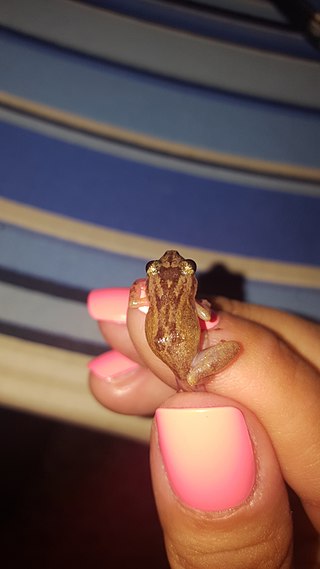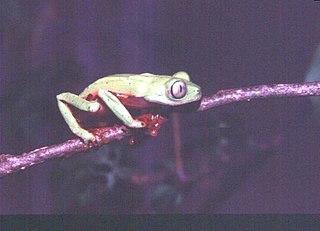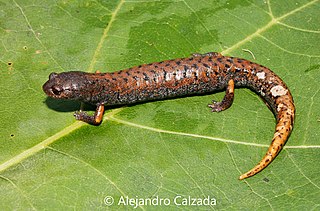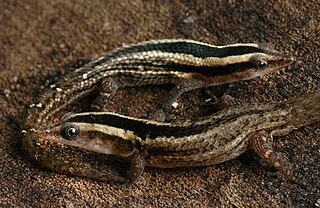
Euparkerella, sometimes known as Guanabara frogs, is a genus of frogs in the family Strabomantidae. They are endemic to the Atlantic coastal forests in the south-eastern Brazilian states of Espírito Santo and Rio de Janeiro. The name Euparkerella honours H. W. Parker, a herpetologist who named the type species, with the Greek prefix eu meaning true and suffix ella, a diminutive form.
Cochran's croaking gecko, also commonly known as Cochran's Caribbean gecko and the Navassa gecko, is a species of lizard in the family Sphaerodactylidae. The species was described in 1931 by Chapman Grant and named after notable American herpetologist and artist Doris Mable Cochran. The species received one of its common names from the loud croaking call of the male during the mating period.

The whistling coquí, Cochran's treefrog, or Cochran's robber frog is a species of frog native to Puerto Rico, the US Virgin Islands, and the British Virgin Islands. This nocturnal insectivore is also referred to as the coquí pitito in Puerto Rico. Their distinctive song is a single, rising whistle, which is repeated and followed by three clicking sounds.

Nymphargus cochranae is a species of frog in the family Centrolenidae. It is found in the lower Amazonian slopes of the Cordillera Occidental of Ecuador and adjacent Colombia, though the Colombian records require confirmation.

Aplastodiscus cochranae is a species of frog in the family Hylidae. It is endemic to the coastal mountains of Santa Catarina, Brazil. The specific name cochranae honors Doris Mable Cochran, an American herpetologist. Common name canebrake treefrog has been coined for this species.

Phasmahyla cochranae, sometimes called the chocolatefoot leaf frog, is a species of frog in the subfamily Phyllomedusinae. It is endemic to Brazil. People have seen it between 800 and 1600 meters above sea level.
Kassina cochranae, sometimes known as the Cochran's running frog, is a species of frog in the family Hyperoliidae. It is found in southern Guinea, Liberia, Sierra Leone, western Ivory Coast, and at least tentatively, southern Ghana. Kassina arboricola was for a period treated as a subspecies Kassina cochranae arboricola, but it is now considered a valid species.

Euparkerella brasiliensis is a species of frog in the family Strabomantidae. It is endemic to Brazil. Its natural habitats are subtropical or tropical moist lowland forest and rural gardens. It is threatened by habitat loss.
Euparkerella robusta is a species of frog in the family Strabomantidae. It is endemic to the state of Espírito Santo in southeastern Brazil. It has been recorded from the municipality of Mimoso do Sul and the neighboring Atílio Vivacqua. Common name Izecksohn's Guanabara frog has been proposed for it.
Euparkerella tridactyla is a species of frog in the family Strabomantidae. It is endemic to Brazil. Its natural habitat is subtropical or tropical moist lowland forest. It is threatened by habitat loss.
Noblella lochites, also known as Ecuador leaf frog, is a species of frog in the family Strabomantidae. It is found on the Amazonian slopes of the Andes and Cordillera del Cóndor and the Cordillera de Cutucú in Ecuador and Peru; the Peruvian record has been disputed, although it is nevertheless expected that the species occurs in Peru.
Noblella myrmecoides is a species of frog in the family Strabomantidae. It is found in the upper Amazon Basin of southeastern Colombia, eastern Ecuador, eastern Peru, Bolivia, and western Brazil (Amazonas). Common name Loreto leaf frog has been coined for this species.
The Kern Plateau salamander is a species of salamander in the family Plethodontidae, endemic to California, in Tulare and Inyo, and Kern Counties in the western United States.

Pseudoeurycea cochranae is a species of salamander in the family Plethodontidae. It is endemic to the Sierra Madre del Sur and Sierra Madre de Oaxaca of central and west-central Oaxaca, Mexico.

Pseudoeurycea mystax is a species of salamander in the family Plethodontidae. It is endemic to Mexico and only known from the area of its type locality in the Sierra Madre de Oaxaca near Ayutla, Oaxaca. Its common name is mustache false brook salamander or mustached false brook salamander. The specific name refers to the whitish protuberances on the lips that resemble a mustache in the frontal view of the male holotype.

The Ugandan lowland shrew or Moon shrew, is a species of mammal in the family Soricidae. It is found in Kenya and Uganda. Its natural habitats are subtropical or tropical swamps and montane forests.

The Mount Cameroon forest shrew or arrogant shrew, is a species of mammal in the family Soricidae endemic to Cameroon. Its natural habitat is subtropical or tropical moist montane forests.

Sphaerodactylus cochranae, commonly known as Cochran's least gecko, is a critically endangered species of lizard in the family Sphaerodactylidae. It is endemic to Hispaniola, specifically found within the Los Haitises National Park and adjacent karst regions in the Dominican Republic.

Darlington's least gecko is a species of lizard in the family Sphaerodactylidae. The species is endemic to the Dominican Republic.
Gelanesaurus cochranae, also known commonly as Cochran's neusticurus, is a species of lizard in the family Gymnophthalmidae. The species is native to northwestern South America.











